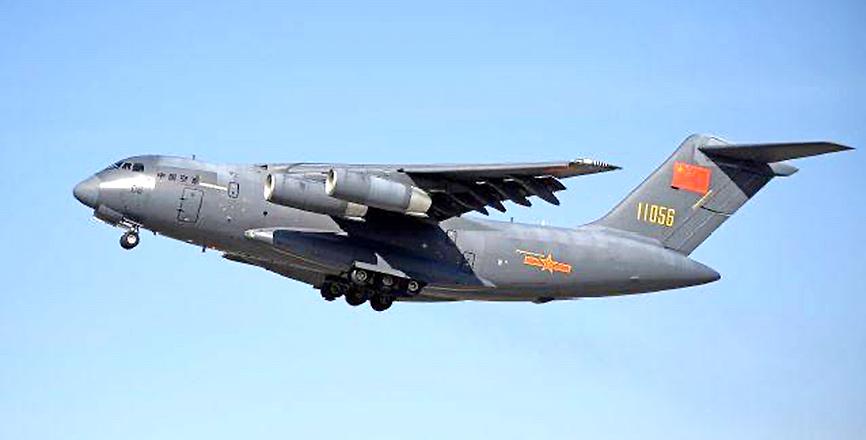Chinese warplanes made 159 incursions into Taiwan’s air defense identification zone last month, Agence France-Presse data showed, the second-highest monthly number on record.
Beijing has ramped up pressure on Taiwan since President Tsai Ing-wen (蔡英文) took office in 2016.
Over the past 14 months, the sabre-rattling has reached new peaks after Beijing began sending an increasing number of warplanes into the zone, which Chinese military aircraft had previously largely avoided.

Photo: Ministry of National Defense / EPA-EFE
The escalatory moves have heightened fears among Western allies that China could order an invasion of Taiwan, even if they consider it unlikely for now.
On Tuesday, the Pentagon unveiled plans to reinforce deployments and bases directed at China, upgrading and expanding military facilities in Guam and Australia.
In Taipei, the Ministry of National Defense began making the Chinese warplane incursions public in September last year and AFP has built a database collecting details of the flights, which have been increasing in size and frequency.
November was the third month in a row in which more than 100 warplanes have made forays.
The incursions last month included 100 by fighter jets and nine by China’s nuclear-capable H6 bombers.
Beijing has stuck to probing the southwestern part of zone.
Near-daily smaller flights means Taiwan’s fleet of fighters is regularly scrambled, while Beijing also sometimes sends larger numbers to show displeasure over specific events.
October remains the busiest month on record with 196 incursions, 149 of which were made over just four days as Beijing marked China’s National Day.
Last month saw fewer large-scale incursions, but a near-daily trickle of planes.
“The recent situation is particularly grim with almost non-stop” incursions, Minister of National Defense Chiu Kuo-cheng (邱國正) said on Monday, after a sortie by 27 Chinese aircraft the day before, the biggest of the month, but only the fifth-largest daily incursion on record.
China’s “intention is to slowly exhaust [us], to let you know that we have this power,” Chiu said.
Chiu has previously warned that military tensions between Taiwan and China are at their highest in four decades, adding that Beijing would be in a position to launch a full-scale invasion by 2025.
Since the ministry first began making the forays public, more than 1,000 flights have been made.
A defense report released by the ministry last month said that China’s “frequent manipulation of gray-zone threats” such as the warplane incursions, are aimed at “seizing Taiwan without a fight.”

Taiwanese can file complaints with the Tourism Administration to report travel agencies if their activities caused termination of a person’s citizenship, Mainland Affairs Council Minister Chiu Chui-cheng (邱垂正) said yesterday, after a podcaster highlighted a case in which a person’s citizenship was canceled for receiving a single-use Chinese passport to enter Russia. The council is aware of incidents in which people who signed up through Chinese travel agencies for tours of Russia were told they could obtain Russian visas and fast-track border clearance, Chiu told reporters on the sidelines of an event in Taipei. However, the travel agencies actually applied

Japanese footwear brand Onitsuka Tiger today issued a public apology and said it has suspended an employee amid allegations that the staff member discriminated against a Vietnamese customer at its Taipei 101 store. Posting on the social media platform Threads yesterday, a user said that an employee at the store said that “those shoes are very expensive” when her friend, who is a migrant worker from Vietnam, asked for assistance. The employee then ignored her until she asked again, to which she replied: "We don't have a size 37." The post had amassed nearly 26,000 likes and 916 comments as of this

New measures aimed at making Taiwan more attractive to foreign professionals came into effect this month, the National Development Council said yesterday. Among the changes, international students at Taiwanese universities would be able to work in Taiwan without a work permit in the two years after they graduate, explainer materials provided by the council said. In addition, foreign nationals who graduated from one of the world’s top 200 universities within the past five years can also apply for a two-year open work permit. Previously, those graduates would have needed to apply for a work permit using point-based criteria or have a Taiwanese company

The Shilin District Prosecutors’ Office yesterday indicted two Taiwanese and issued a wanted notice for Pete Liu (劉作虎), founder of Shenzhen-based smartphone manufacturer OnePlus Technology Co (萬普拉斯科技), for allegedly contravening the Act Governing Relations Between the People of the Taiwan Area and the Mainland Area (臺灣地區與大陸地區人民關係條例) by poaching 70 engineers in Taiwan. Liu allegedly traveled to Taiwan at the end of 2014 and met with a Taiwanese man surnamed Lin (林) to discuss establishing a mobile software research and development (R&D) team in Taiwan, prosecutors said. Without approval from the government, Lin, following Liu’s instructions, recruited more than 70 software